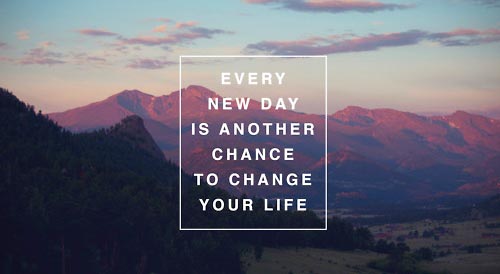Success Advice
How I Changed My Environment So That I Could Reach Success

Editors note: I received this great and inspiring story from Sheldon Scipio earlier today, and found that it embodies the truths of how most people become successful in their life.
Successful people are aware that at some point, if they wish to reach success then they needed to shake things up a little and change their environment to take it to the next level. They adjust the sails, follow their compass or take the better lane as they are approaching “that fork stuck in the road”. Sheldon shares the crucial moments and the decisions that he made while he was chasing his dreams of a better life, and how important it is to position yourself in a better environment for success.
Enjoy! – Joel Brown | CEO & Founder of Addicted2Success
Changing Your Environment To Reach Success
“I wanted to grow, not that I did not have a good job, I was now a member of Senior staff, I travelled, I had a small staff report to me, a car, benefits. I represented the company at International Conferences, where I learned lots. But during these Conferences my mind was opened from meeting all these former and present entrepreneurs and leaders, they fuelled my hunger with their stories:
A mind once expanded with knowledge cannot return to its former way of thinking
I found myself seeking new opportunities within the company, and getting cut short at each turn, but I didn’t give up, I expanded within my limits till I was stuck, nowhere to go.
Then, one day I got a casual call for a problem one of my junior staff couldn’t fix, but, it was after hours. I did the usual and started sorting the customer out. Suddenly the customer complained of the time, and asked could we continue tomorrow, I said no problem (tomorrow would take us into the weekend). He agreed to call me when he was set.
The next day at about noon the call came, we had a friendly chat until I solved the problem, It lasted the lunch hour or so. We spoke about my Family, Me, what I had done in life etc. When I solved his problem, he told me his business partner was experiencing a similar issue, could he let him call me this weekend also. I agreed.
Sunday at around 1PM his partner called, the call was similar, relaxing chit-chat etc, problem solved, by that time the call had gone to first name basis. and he invited, or rather demanded that I meet them for a drink after working hours on Tuesday. I agreed that we would confirm at noon Tuesday.
Tuesday, We all met at a popular hangout spot for the more affluent. I was introduced to a few businessmen that I knew from seeing them in the news. We sat had a few drinks, then these men explained the weekend to me. They had been looking to recruit someone to become and Executive, who works beyond the call, had the right attitude, understood the importance of building relationships and conversation, and had a burning ambition, they chose me. If I said “Yes” they would teach me to be an Executive, a Businessman, If I chose “No’ I could now choose from 2 options, get up and leave, or stay around them spend some time and learn, maybe I would change my mind. (I could not afford to hangout with these guys, this place is too pricey even for my salary). I chose to seize the opportunity after I was fully explained the risk.
The risk was “leave your job and help us build this opportunity”, and if it works you will be at the top of the game, if it fails, you will lose everything, except the experience and our friendship. It failed and I lost exactly almost everything, I did gain an insatiable hunger, and invaluable experience, I felt like I completed a Doctorate in Entrepreneurship, Thinking Big, Leadership and Execution.
The old job was there, I turned it down, I started building my own Company, I wanted to be an enhanced version of these same guys. I kept rubbing shoulders with them 3 times weekly.
One day I looked back and realized that everything changed, my perspective, goals, desires, speech, decisions, friends. My optimism was now permanent, my dress (I bought less party clothing), I ate better food, and less food, I stopped going to many parties, and chose carefully what events I attended, I read more books, I began to think, act and behave like one of them, a CEO/Business Owner. Life felt enriched. My older friends treated me a different respect. Most importantly I became more humble, respectful, open-minded and charged to go every single morning, while attracting International business opportunities and friends.
It came full circle when my first venture needed the services of one of these impeccable gentlemen, and over a drink, we arranged for me to meet his CEO. When I arrived that morning, the way I was greeted was my first instalment into my new world, I led the discussion and terms were accepted and agreed upon. We went out for a drink to celebrate the partnership. My friends were there, I secretly asked if they engineered the deal behind the scene, the answer was “No”. They said it was all me, and they saw no need to help, since they admire how I handle myself, and that they consider me as “One of the Boys”. We don’t hangout every week anymore, but once monthly we connect, sometimes laugh at my growth, and praise and encourage each other along our separate ventures, share trade secrets and tips.
The change was natural, and such an important part of the process to my Success. I now own or partly own 2 International Companies, and lead all group negotiations. My hunger, passion, goals grow with the more I learn. I slipped a couple of times, I look around and see that like in the story of Peter walking on water, I took my eyes off the prize, and strayed mentally into the wrong environment, and quickly adjust my GPS.
Many lessons were learned, many more to learn, success is a journey, I am enjoying mine. I did learn that most important to my success was the people I spent time with, I started reading, speaking, thinking like them, and they were all Successful International Businessmen, I learned that if you focus on your goals and commit to them, the Universe will bring you the right people to help you manifest your vision!”
And remember this:

Business
Why Smart Entrepreneurs Are Quietly Buying Gold and Silver
When stocks, property, and cash move together, smart business owners turn to one asset that plays by different rules.

You’ve built your business from the ground up. You know what it takes to create value, manage risk, and grow wealth. But here’s something that might surprise you: some of the most successful entrepreneurs are quietly adding physical gold and silver to their portfolios. (more…)
Business
The Simple Security Stack Every Online Business Needs
Most small businesses are exposed online without realising it. This simple protection stack keeps costs low and risks lower.

Running a business online brings speed and reach, but it also brings risk. Data moves fast. Payments travel across borders. Teams log in from homes, cafés, and airports. (more…)
Business
If Your Business Internet Keeps Letting You Down, Read This
From smoother operations to better security, dedicated internet access is quietly powering today’s high-performing businesses.

Today, a dependable internet service is the bedrock for uninterrupted business operations. Many organizations rely on stable online connections for communication, data transfer, and customer interaction. (more…)
Did You Know
How Skilled Migrants Are Building Successful Careers After Moving Countries
Behind every successful skilled migrant career is a mix of resilience, strategy, and navigating systems built for locals.

Moving to a new country for work is exciting, but it can also be unnerving. Skilled migrants leave behind familiar systems, networks, and support to pursue better job opportunities and a better future for their families. (more…)
-

 News2 weeks ago
News2 weeks agoBrandon Willington Builds 7-Figure Business by Ignoring Almost Everything
-

 Health & Fitness3 weeks ago
Health & Fitness3 weeks agoWhat Minimalism Actually Means for Your Wellness Choices
-

 Did You Know3 weeks ago
Did You Know3 weeks agoWhy Most Online Courses Fail and How to Fix Them
-

 Business3 weeks ago
Business3 weeks agoIf Your Business Internet Keeps Letting You Down, Read This
-

 Business2 weeks ago
Business2 weeks agoEntrepreneur’s Guide to Pay Stubs: Why Freelancers and Small Business Owners Need a Smart Generator
-

 Business1 week ago
Business1 week agoThe Salary Shift Giving UK Employers An Unexpected Edge
-

 Business1 week ago
Business1 week agoThe Simple Security Stack Every Online Business Needs
-

 Scale Your Business1 week ago
Scale Your Business1 week ago5 Real Ways to Grow Your User Base Fast


























23 Comments